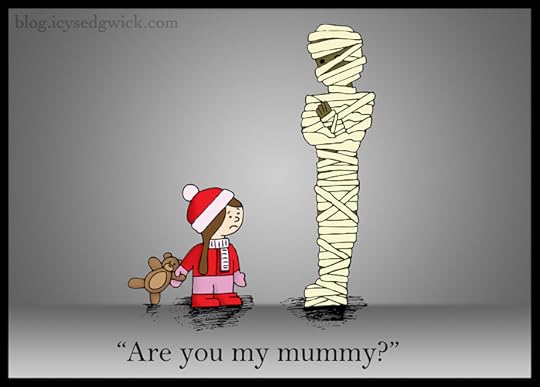Icy Sedgwick's Blog, page 87
December 28, 2012
#FridayFlash - Lost Child

They do say that a picture is worth a thousand words, and if Hemingway could get away with writing a story that's just six words long, then why not tell a flash using a picture and a single line of dialogue?

Published on December 28, 2012 05:17
December 27, 2012
2012 or 2013?

Everyone else appears to be doing reviews of 2012, and for a while, I did think about dissecting the year using various typical headings. Problem was, I couldn't remember what books I'd read this year (or what I'd read in 2011), and I couldn't remember all of the films I'd seen in 2012. Thinking back on it all, I simply depressed myself because this year has not been particularly great. I've had two break ups, countless other difficulties with interpersonal relationships, other needless hassle, and not a lot of success in the writing department - basically, I didn't have time to write as much as I'd have liked since I had other, more pressing, demands on my time. While yes, I celebrated the first anniversary of publication of The Guns of Retribution , and I did complete the first version of The Necromancer's Apprentice which is currently with the beta readers, I didn't really have time to do any more and that as rather depressed me. However, I did have a few stories appearing in various anthologies, and I've done well on the PhD front. I think the best part of the year was easily my trip to Venice in the summer, which inspired a scattering of Friday flashes (the photo is me in the Piazza San Marco in front of the Basilica, with the Campanile to the right).
So instead of looking back across the year that was, I'm going to look forward to the year that will be. I don't do resolutions, and haven't done so for a very long time, but I am going to set myself some goals instead - goals are things you would like to reach, while resolutions are things you will do, and unfortunately my temperament tends to skitter away from things I must do in favour of things I want to do, rendering the implementation of resolutions somewhat problematic. So in 2013, I intend to complete at least one more writing project next year, be it another novella or a full-length novel, as well as hopefully putting out another anthology of short stories. I've got plenty of ideas for novels so that shouldn't be an issue...so long as I manage to find the time! I've been outlining towards the end of this year so I've got plenty to start on when I've finished editing my Fowlis Westerby novel. Once I've got the structural outline in place I tend to find it easier to 'fill in the gaps', so to speak.
Away from writing fiction, I also intend to keep working on my digital art, as well as working hard towards my PhD. I've got two essays to plan and write for possible inclusion in anthologies, and with the literature review and historical context chapters out of the way, I'll be able to get my teeth into the main 'meat' of my thesis. I'm actually really looking forward to it, and I'm extremely lucky to have chosen such a wide-ranging set of topics, making the research a pleasure as opposed to a chore. I finish my teacher training course in May, which should free me up to devote my time to other pursuits. Whether that's blogging, writing, knitting, drawing or something else I haven't yet taken up as a hobby, I don't know yet, but it'll be lovely to have the time to choose!
All I will say in closing is thank you to anyone who has bought a copy of one of my books this year, because if people didn't buy them I'd give serious thought to just quitting this mad business altogether.

Published on December 27, 2012 09:59
December 24, 2012
Redemption: A Christmas Story

I originally wrote this story as a response to a particular 'classic' Christmas movie, and it also appears on my website. See if you can guess which film inspired it...and merry Christmas!
* * *
Detective Carmichael stands with his back to me, staring out of the window.
“And you say that’s where he jumped? Right there?”
The detective points towards the bridge, and the churning black river below. For a second, I’m standing behind the rail again, a stiff breeze driving icy spray into my face. The water smells of winter and regret.
“Yep. Right over that rail. Tried to talk him outta it, but he just wouldn’t listen.”
“Yeah right. You’re hardly the charitable type, are you?”
Detective Carmichael leans against the wall beside the small stove. He flicks a wooden toothpick between his lips. It clicks against his yellow teeth. Of all the people who could have fished me out of the river, why did it have to be him?
“Believe it or not, I’m a nice guy!” I spread my hands wide and try a sheepish smile. Usually works on most people, but not him. His flinty eyes glitter in the shadows. I shiver under my blanket, only this time it’s not because I just took a midnight swim in the river.
“Clarence, I know they call you the Angel, but I think we both know that you’re no nice guy. Now George Bailey? He was a nice guy. My mother wouldn’t have her house if it weren't for him.” He pauses to lift the whistling kettle from the stove. “Now why don’t you make this easier on yourself and just tell me why you pushed him?”
“I didn’t, I’m tellin’ ya! I was going home and I saw him climb over the railing. Ain’t no way I’m gonna let some guy kill himself at Christmas. That just ain’t right. I tried to talk him down but he wouldn’t listen. Then he jumped.”
I sneeze. Detective Carmichael pours hot water into a waiting mug, and offers it to me. I wrap my hands around it, glad of the warmth. The detective puts the kettle down and fishes his leather-bound notebook out of his top pocket. He licks the tip of a stubby yellow pencil and scribbles down what I just said.
“Did he say why he was doing it? I mean, you’re saying that you tried to talk him down. He must have had some kind of reason. A guy doesn’t just throw himself into the river for nothing.”
“He kept sayin’ somethin’ about money. He’d lost it, and couldn’t find it nowhere, and he was in a lotta trouble. He said somethin’ about not wantin’ the business in the first damn place, he wanted to get out, get away from here. Kept sayin’ ol’ man Potter finally had his way.”
I shivered as I remembered the look on the poor guy’s face. Total despair mixed with innocence, like an angel who has a job to do but can’t fight human nature.
“I see. What did you actually say to him?”
“Just tried to get him to feel better, y’know? He said he wished he hadn’t been born. Now I know the guy, I know all the good stuff he’s done for this town. I tried remindin’ him of that. Told him about his brother, and how he wouldn’t be here today if it weren’t for him. Harry couldn’t have shot down all those Germans if George hadn’t been born.” I pause to think. Talking down a suicidal man is a stressful business. “I tried to get him to think of his wife ‘n kids. He was one lucky guy, havin’ a nice family like that. Mary woulda done anythin’ for him and those kids.”
“OK, Clarence, you got a point. So maybe you didn’t push him,” says Detective Carmichael. He puts the notebook back in his pocket. We’ve gone ‘off the record’. “But I’m still surprised that you tried to help. There’s something you’re not telling me.”
“Well, the Man Upstairs wanted me to do somethin’ about it. He heard rumours things weren't good, and he asked me to check on him. The minute he told me it was George in trouble, I decided to help. Couldn’t let a nice guy like that throw himself in the river.”
“What has the Man Upstairs got to do with this? Why would a hood care about George Bailey?”
“He heard Potter might be involved, and you know the history between those two. But I just really, genuinely wanted to help.”
“Why?”
“Promise you won’t tell anyone else?”
Detective Carmichael moves his head. The light falls on his face. I try to ignore his twisted, shiny scars as he looks me up and down. Man, if those scars could talk, they’d have some hellish stories to tell. But, anyway. He nods.
“I was trying to earn my wings,” I mumble.
“Your what?” One eyebrow creeps halfway up his forehead. A puckered white line cuts through the hair.
“My wings. Look, way I see it, I’ve done some pretty bad shit in my time, and it’s obvious where I’ll be goin’ come Judgment Day. Never used to bother me, but now I got a wife and kid, I want a better life. I thought tryin’ to help might go some way to balancin’ stuff out.” I wriggle deeper into the blanket and look away. Doesn’t seem right telling someone like him something like that.
Detective Carmichael says nothing. He looks me up and down again, his face unreadable. That look in his eyes could just as easily be disgust as it could pity. Pulling up the collar of his coat, he walks over to the door.
“You know, Clarence, there’s a chance we can fish him out downstream. Maybe he’ll still be alive,” he says.
He opens the door and walks out into the damp night. The door swings closed behind him, and I watch him through the window until he disappears into the mist. I look back to the river. When I was up there, talking him down, I felt the same pull George Bailey must have felt. It’d be so easy. Just throw yourself in; the water will hold you, embrace you, make it all okay. It’s always cold all the year round, you won’t even feel anything. I’d be beyond the Man Upstairs, and all the associates. My wife might even get some insurance money, and my daughter could grow up without scum like me holding her back.
The wind throws a wave right up the bank. The water crashes into the window, breaking my train of thought. The cold water runs down the window in drops, like the world is crying. I think of Marsha and Stephanie, and how they’d cry without me. I break free of the river’s hold. I can’t do it. I’ve got other poor suckers to help. I might earn my wings yet.
* * *
The original image was uploaded to Wikimedia Commons by user Heidas, but has been edited slightly by me.

Published on December 24, 2012 06:31
December 20, 2012
#FridayFlash - They're Here

It's early Friday
morning and folk everywhere are running around, panic buying like the world's
gonna end. I guess in some parts of the world it's already late in the day so
maybe it is gonna end. I can't stand the hustle, so I go to my usual bolt hole
- the diner on Forth Street. It's a tacky little dive on the edge of town, all
cracked red vinyl seats and streaky chrome fittings, but it's warm and the
staff are nice. It's empty aside from a homeless guy warming himself by the
heater, so I make for my favourite booth. Macy pours me a black coffee and
fixes me a waffle with syrup.
"You ok, hon?"
She's about fifty, with a bright red beehive and purple eyeshadow. Looks like
some kind of retro cartoon character who never left the 1950s. She's like the
kind of mom I wish I'd had, if mine hadn't been crazy.
"I guess."
"All this stuff
gettin' to ya, huh?" She vaguely waves at the window and I watch a man run
past carrying a small flatscreen TV. I've no idea what good he thinks that'll
do him in the apocalypse but maybe he just wants to watch it all on the news.
"I just wanted to
get away from these end of the world nuts. I've had this all my life, I don't
need everyone coming out with it at the same time."
Macy raises an eyebrow
and leans forward across the counter. I scoot across the booth and take up a
seat opposite her. I tell her all about my mom's theory, about the aliens. She
always said the world wasn't gonna end today, it was just that the world was
gonna end as we knew it. She even reckoned that’s what the REM song was about. You
learned to never ask what she meant, 'cause that's what got her started on
about the aliens. Said she'd been abducted back in '73, and they didn't take
her to a spaceship, said it was some kind of ancient ruin. Sounds like the
kinda thing you'd see Indiana Jones running about in. Anyways, she'd get on her
high horse and start saying the aliens had always been here, and the Mayans
knew all about them. Hell, some of them probably WERE aliens.
I finish my story and
drain the last of my coffee from the chipped mug. Macy gives me a funny look
and leans closer, so close I can smell her lavender perfume. She waits until
the homeless guy shuffles out.
"Your mom weren't
wrong".
"What?"
"The aliens ain't
invading, hon - they never left. They're just coming out of hiding."
For the first time, I
notice her eyes - yellow irises, flecked with red. That ain't normal. When she
moves her sleeve rides up and I see the tattoos on her arm. Some kind of marking,
looks like the kind of Inca art I saw on the Discovery channel once.
"So all this end
of the world crap is real?"
"Oh yes. Well, not
for me." Macy smiles that strange crooked smile of hers.
"I suppose you're
one of 'em, huh?"
"I am. I already
saw you clocked the tattoo. Got it when I was eighteen. Jeebus, that was over
1300 years ago. Bet you're wonderin' why I dress like this, huh?"
"I'm wonderin' a
lot of things, Macy."
"I just like the
style, I guess. Anyway, all this ain't just a new beginning for me, hon. It's
the same for you."
"Huh?"
"Your mom did meet
us in 1973, only it weren't no abduction. She met your dad in 1972, and he was
damned smitten by her. Took her to meet everyone back at the Prime Colony, only
she couldn't take the truth and she went a bit crazy. After that, we scattered,
and didn't try to start nothin' with the humans."
"So where does
that leave me?"
"Don't worry, hon.
Your dad'll come get you. It's time for you to go home."
“You’re sayin’ I’m an
alien too?”
“Well half alien, hon.
Guess that makes you legal.”
Macy winks and
straightens up. She flicks the TV on and it's all over the news - total
pandemonium. Looting, rioting, fires, everything. I head back to my booth, and
eat my waffle. I try to feel something, some kind of panic, or fear, but
somehow I can’t. I worry a bit about my mom but all I can think of is my dad.
Humanity tears itself apart and I’m sat there wondering if I look like a guy I’ve
never met – who isn’t even really a guy.
It’s a funny old world,
ain’t it? And now it’s ending. Huh. Never saw that one coming.

Published on December 20, 2012 22:00
December 18, 2012
Instagram - Yes or No?

A rather stunning sky over Jarrow
So Instagram, the photo sharing service that was bought by Facebook earlier in the year, have changed their privacy policy and terms of service. I actually read them yesterday, and found that apparently "Nothing has changed about your photos’ ownership or who can see them"...which appears to directly contradict point 1 of their Rights section, in which they state that "Instagram does not claim ownership of any Content that you post on or through the Service. Instead, you hereby grant to Instagram a non-exclusive, fully paid and royalty-free, transferable, sub-licensable, worldwide license to use the Content that you post on or through the Service". In point 2, they point out that "some or all of the Service may be supported by advertising revenue. To help us deliver interesting paid or sponsored content or promotions, you agree that a business or other entity may pay us to display your username, likeness, photos (along with any associated metadata), and/or actions you take, in connection with paid or sponsored content or promotions, without any compensation to you"...yet in point 8 they say that "you agree that Instagram is not responsible for, and does not endorse, Content posted within the Service". So basically, Instagram are saying that they aren't responsible for your content, nor do they own it, but it's perfectly okay for them to let other people use your username and photos etc. in promotions without paying you.

The Leazes Park bandstand
I used to love Instagram, but since they were bought by Facebook, I haven't been impressed by some of their decisions. This one in particular makes me feel very uneasy. Theoretically, Newcastle City Council could pay Facebook to license photos I've taken around the city in their advertising - without me seeing a penny of it. By comparison, Google can't sell photos you upload through Picasa or Google+, and Flickr can only use the images you upload "solely for the purpose for which such content was submitted or made available". True, there don't appear to be any immediate plans to monetise the images currently available on Instagram but that doesn't mean that they won't.
It's bad enough having people using your content without crediting you (I've had people steal my photos and cover up my copyright with their own tat, as if that somehow nullifies the existence of the copyright) but to force the change through your terms of service? I suppose the question comes down to whether or not I'm prepared to put up with that possibility (bearing in mind no one might ever use my images) or whether I'm irritated enough to delete my account. After all, I put most of my images on Facebook and Twitter anyway, as well as Flickr, so would it really matter if I didn't use Instagram? I can achieve all of its filter effects through Photoshop so it's not like it's really going to bother me if I'm sharing photos through Twitter instead.

My Halloween 'Lady Beetlejuice' costume
Thing is, there are a lot of photos of me on Instagram - do I really want someone using those without my express permission? There was an episode of Friends years ago in which Joey's photo was used on an advert about VD, and it put off countless women as they assumed that meant he had one form or other of it. I don't want to get into the situation where someone I don't even know decides to use a photo of me, and the association is a negative or embarrassing one. I'm quite happy to embarrass myself or project myself badly but I don't want someone else to do it for me. I wouldn't mind leaving up photos of cakes I've made, or daft signs I've found, but there doesn't seem to be any way of deleting individual photos, so I can't even alter the way I use the service by removing those images that I wouldn't want them to make available.
So question is...do I stay or do I go?

Published on December 18, 2012 08:14
December 17, 2012
Culture Cuts

Newcastle's Laing Art Gallery
I've been annoyed for quite some time about the plummeting status of culture and the arts in the UK, and the growing clamour for better funding for sport following the success of the Olympics has further demonstrated the divide between those who think the arts are important, and those who don't. It's become particular apparent in my hometown of Newcastle upon Tyne, where the City Council, in a glorious fit of short-sightedness, have announced their intention to slash the entire culture budget of £2.5 million due to a reduction in funds from central government. I'm well aware that we're living in times of austerity and that cuts must be made across the board, but unfortunately it could be argued that the City Council, currently held by Labour, are using the budget cuts as a political tool. They can cut whatever they see as being unnecessary, and then blame the fiscal ineptitude of the Coalition government for the need to make cuts in the first place. Back in 2008, Newcastle entered their bid to be crowned European Capital of Culture. Liverpool ended up winning, but how on earth could we possibly enter such a competition again, with no culture to speak of? The Council claim that their contributions towards these institutions are the smallest portion of each institution's funding, and that removal of Council support would not result in closure, but that sounds like very cold comfort indeed.
For those of you who have never visited Newcastle, the city isn't all drunken nights out and women wearing no coats in the depths of winter. The city centre boasts two museums, two major art galleries, three theatre spaces, an independent cinema with links to the BFI, and a handful of small comedy venues. The north east as a whole has produced the likes of Sir Ridley Scott, Neil Marshall, Sting, John Martin, Thomas Bewick, and Terry Deary. Charles Dickens enjoyed visiting the city and even J. R. R. Tolkien had links with the area. Surely this qualifies as a rich cultural heritage that is both worthy of preservation and celebration?
Some time ago, the City Council also announced their intention to close ten public libraries around the city - libraries which, it must be remembered, grant access to knowledge to those who perhaps cannot afford to buy piles of books. The Council have argued that no one will live more than 1.5 miles from their nearest library, but for some, even this distance could be too great, making library visits difficult, if not impossible. Besides, libraries do not simply offer books, they also allow users to enjoy IT facilities and internet access. Not everyone has both of these at home, and in a time of increasing digitisation of such things as job applications, banking and even paying your TV license, the only way some people can do these is to use their local library. How can we get people back into work if they can't get online to send a CV? The two sets of budget cuts go hand in hand - after all, this decimation of the cultural budget would affect such institutions as the Great North Museum. Imagine this scenario - a class of primary school pupils visit the museum, and enjoy one of the shows in the planetarium. Several of the pupils express a particular interest in astronomy, their parents locate relevant books in their local libraries, and the seeds are sown for the next generation of Patrick Moores and Brian Coxs. Without the libraries or the museum, how can we expose children to future career paths? Instead, we bombard them with reality TV shows and they grow up wanting to be pop stars or models.
Thankfully I'm not the only one who finds these proposed cuts utterly abhorrent. Northern musical heavyweights Bryan Ferry, Sting, Mark Knopfler and Neil Tennant have penned a letter to the Council in The Guardian, pointing out that without funding to culture and the arts, both avenues become the preserve of the wealthy, and opportunities are denied to the next generation - the next generation which is currently being told it MUST go into sport. The arts and culture provide employment prospects, and things like the film industry even raise the prospect of bringing investment into an area (e.g. Glasgow doubling as Philadelphia, for World War Z).
I leave you with one final thought. Truly one of the most outstanding contributions to the Olympics was the ambitious opening ceremony by Danny Boyle. Without cultural funding, how can we possibly support the next generation of filmmakers, artists, writers, dancers, actors and photographers, those people who will document our culture and society, preserving it for those who will come later?

Published on December 17, 2012 06:58
December 14, 2012
#FridayFlash - Sand and Snow

Outside in the cold, bells toll around the city to ring in the special day. Delicate flakes of snow dance and whirl through the frozen air in their own celebration ballet. Strangers exchange seasonal greetings in the street, warm with the glow of red wine and mince pies.
Inside the museum, whispers echo around empty halls, and ancient words entwine with plaster and glass. Syllables slide through cracked stone; the sarcophagus fills with spells not heard in three thousand years. Dessicated flesh stirs inside flaking wrappings and sparks flare within empty sockets. Skeletal hands press against wood; the coffin lid clatters to the floor. The owner of the voice steps forward to push aside the stone slab.
A pale hand grips the gnarled ancient fingers and helps the figure clamber to its feet. Recognition flickers in the eyes of the mummy princess. Many centuries have passed since she last laid eyes on the man before her. Her heart would skip a beat if it had not been replaced by a clay amulet.
The arcane priest leads her across the parquet floor of the Egyptian Gallery, one hesitant shuffling step at a time. He places a cold finger to his lips, calling for quiet. The beam of a torch swings through the doorway as the night watchmen performs his rounds. He does not notice the wizened mummy princess and her curious pale companion in the shadows.
They leave their hiding place and make their way through the museum. The sparks in the mummy's eyes grow brighter as she takes in the wealth of history, all younger than her but older than the museum, as they tread through the empty halls. They reach the entrance atrium, and the priest waves his hand. The glass doors swing open, and he leads his princess outside.
Snow lies several feet thick, heaped against the gutter, blown aside to clear the road. The black trees of the avenue wear their wintry white coats with pride, limbs extended to the heavens in silent thanks for the seasonal bounty. The mummy princess gawps, her jaw hung loose by withered tendons. The snow reminds her of the sand of her youth, though she does not remember white sand that glitters beneath light. She marvels at the lamp posts with their artificial suns.
The priest leads his ancient prize into the street. Snowflakes drift toward them, settling on yellowed wrappings and worn cloak alike. The princess spots patterns traced in the frost on the windows. Her face labours but produces a smile, and the sparks in her eyes glow white with pleasure. The priest returns the smile, and their hands find each other in the cold.
They stand watching the snow fall as the bells ring out for Christmas Day.

Published on December 14, 2012 09:50
December 7, 2012
#FridayFlash - Mr Magpie

Anna peered through the camera’s viewfinder. She centred the bandstand in the frame and adjusted the aperture to lengthen the depth of the field.
Click.
Anna pressed the preview button on the camera. Her photo appeared on the screen. She’d need to alter the contrast but otherwise it was a good capture. Frost turned the paving white, and frozen cobwebs hung from the bandstand’s wrought iron. She smiled. Others might pass the deserted bandstand in the quiet park and not notice it – to her, it was another beautiful view.
She turned to frame a shot of the path leading down to the lake. Geese slithered across the ice, their webbed feet ill-suited to the winter conditions.
A flutter of black and white passed before her lens. She lowered the camera to see a magpie perched on a stump. It cocked its head on one side and stared at her.
“Hello, Mr Magpie,” she called. “Would you pose for me?”
The magpie moved, leaning forwards with its wings outstretched, a parody of the carved eagles behind the bandstand. Anna switched her camera to rapid capture and fired off a string of photos. She paused to review the photos, pleased with the contrast of the black and white feathers and frosted grass.
“Thank you, they look–”
Anna looked up and stopped as the magpie took to the air. She watched its flight over the hedges, and into the knot of trees beyond. Anna didn’t venture into the woods, preferring the wider vista of the open slope down to the lake. Still, she hadn’t expected to take photos of birds, and the magpie shots were the best she’d taken today. Perhaps she’d find something better among the trees.
Anna made her way along the path. The trees closed over the trail, their leafless branches forming an arch of icy wood. Anna snapped photos of frost-encrusted flowers too stubborn to make way for winter, and she captured an image of a squirrel burying nuts at the foot of an oak.
The path led into a clearing, surrounded by evergreens. A carpet of fallen leaves covered the ground, and tree stumps thrust out of the autumnal sea like the rocks in the bay. Anna froze, realising she was not alone. A young man sat on one of the stumps. Flowing black hair streaked with white and petrol blue tumbled down his back, and he stared at her with glittering eyes so dark they looked black. He wore a ragged suit of black velvet, with a flowing white shirt beneath it. He doffed his battered top hat.
“Good morning, Mistress Photographer.”
“I’m sorry, I didn’t know anyone was here,” said Anna.
“That’s quite alright, my dear. How could you have known? You are not psychic.” A smirk hovered around his pale lips.
“No, I’m not.” Anna frowned.
“I, on the other hand, am very much psychic. I can tell what you’re thinking right now, as it happens.”
Anna raised one eyebrow and said nothing.
“You were searching for a magpie.”
“Not exactly. I saw it fly over here and I thought I’d come and explore.”
“You’re always searching, Anna. Always trying to find something. If only you knew what you were looking for!”
Anna started at the mention of her name, and took a step backwards. The young man’s smirk erupted into a full smile. Without meaning to, she found herself returning the smile. He was very strange, but rather good-looking, in a haughty, emaciated sort of way. Anna couldn’t remember the last time a boy had even looked at her, let alone spoken to her.
“You should stop looking, Anna. You will never find the treasure you seek.”
“How do you know my name?”
“I told you, I am psychic. But you won’t find the treasure because you are the treasure. Do you understand?”
Anna shook her head. The young man laughed and leapt to his feet. Anna could see white socks through the holes in his patchwork boots. He seized her hand and pressed it to his lips.
“Have a care, young Anna. You are the treasure!”
A cloud passed before the sun, casting long shadows across the clearing. Anna felt the young man release her hand, and when the sun returned, he was gone. She stood alone in the clearing. She looked at her hand, expecting to see some sort of mark from the strange young man’s lips. Her fingers felt lighter than usual, and she realised her ring was missing. It was only a fake diamante ring from a stall at the market, but she liked the way it sparkled on her middle finger. Now it was gone.
What a bastard, he must have taken it! At least it only cost a couple of quid.
Anna turned to leave the clearing when she noticed something on the tree stump. A long black feather, coloured with splashes of petrol blue. She turned it over in her hand, enjoying play of light across the blue, like oil on water. On impulse, she pushed it into her hair, and left the clearing.
Anna headed towards the Wilson Street exit, determined to head home and edit her photos. She was so preoccupied that she didn’t notice the young man coming the other way until she collided with him.
“Hey, sorry, are you okay?” The young man touched her shoulder. She looked up into a familiar face – it was Ben, from the photographic society.
“Yeah, I’m fine.”
“You’re Anna, right?”
Anna nodded.
“Were you taking photos for our latest assignment?”
Anna nodded again, too amazed to speak.
“I was just cutting through the park to go get a coffee. You want to come with me? We can talk about it.”
Anna nodded, adding a smile to her answer. Ben grinned, and they headed back through the park towards town. As he chattered away about his latest camera purchase, Anna touched the feather in her hair and smiled.
I am the treasure.

Published on December 07, 2012 00:30
December 6, 2012
Published in the Deck the Halls anthology

I'm rather pleased to announce that I have a story in yet another anthology! In addition to my story, A Girl's Best Friend, in Best of Friday Flash: Volume Two , and Anonymous in the Penny Dreadfuls Halloween Special , I now have Apprentices to Time in Deck the Halls: Festive Tales of Fear and Cheer.
The story appeared online in its original form a couple of years ago in answer to a prompt - Emergent Publishing were putting together a collection of stories, each of which took a line from Deck the Halls as a story prompt. My line was 'Fast away the old year passes' and I chose to write a story about New Year. It was also the first time I introduced my female Death character, who you might remember from some of my Friday Flashes (particularly New Year's Dance , about my Captain Scarlight character). She's become a bit of a favourite of mine, and it's rather awesome to be able to share her story again, albeit revised and updated!
The blurb on the Emergent website runs thus;
DECK THE HALLS traverses the joy and jeopardy of the festive season, from Yule to Mōdraniht, Summer Solstice to Years’ End. The stories journey through consternations and celebrations, past, present and future, which might be or never were.
Along the way you’ll meet troll hunters, consumer dissidents, corset-bound adventurers, a joint-toking spirit, big-hearted gangbangers, an outcast hybrid spaceship, petrol-toting politicians, mythical swingers and a boy who unwittingly controls the weather.
Heart-warming and horrifying, the collection is a merry measure of cross-genre, short fiction subverting traditional notions of the holiday season.
It's available from the Emergent Store as a PDF, mobi or epub file, and you can order a good old-fashioned paperback too. Go on, get yourself an early Christmas present...

Published on December 06, 2012 00:57
November 30, 2012
#FridayFlash - A Little Flutter

Ever since I was a kid, I was always that idiot shouting "I bet you anything that..." Couldn't start a sentence without it. The missus used to watch all the soaps, and I was forever shouting bets about what characters would do next. Used to drive her mad. She'd stick a tenner in my hand and send me down William Hill, just to get some peace.
So anyway. It's a Tuesday afternoon, and I've been sent home from work. Quiet day, like, nothing else to do. Boss figured he'd save himself some money. I reckon I'll give Susan some peace, so I go off down the bookies. I'm £30 down after an hour but it's early yet so I'm not leaving. Reckon I'll win it back, you know? Anyway. I've just put a tenner on Buford's Chase and he's running well. Like an idiot, I start shouting, "I bet he wins!"
Damn thing loses so I start shouting that I bet the race was fixed, always "I bet this" and "I bet that". One of the girls behind the counter brings me a cuppa and asks me to pipe down, so I do. For a while. Eventually I start mumbling to myself, I bet I could win back my £40. I reckon it'll be easy, if only I pick the right horse. For a second I think about the one armed bandits but I know they're fixed.
So anyway. I'm looking through the listings for the next race. I don't have a system, not really, and by this point I'm just picking names I like. This guy comes up to me, so quiet I don't hear him until he clears his throat. He's dressed a bit funny, in a three piece suit and carrying a cane, but you get all sorts down the bookies, so I think nothing of it. He leans over and says we should make things interesting. I tell him I'm just trying to win back my £40, and hope he'll go away. He gives this big smile, all white teeth like those insurance people on the telly. Says that if I bet on Faust's Hubris and it wins, he'll give me £10,000. If it loses, this geezer gets my soul. I reckon he's a nutjob but I look up the horse, and the odds are good so I fling in a bet. Only a tenner, mind. Susan'll kill me if I lose any more than £50. That'd be worse than losing my soul - my missus has a right mouth on her when she gets riled up.
Anyway, the horse runs well, and I reckon I might be close to winning. I don't think the crazy will pay out £10,000 but the odds are 4 to 1, so I'll at least win £50. I can go home and Susan'll never know. Faust's Hubris is out in front, but the stupid thing falls in the last furlong. I'm halfway through shouting "I bet the race is fixed" when the guy puts a hand on my arm. His fingers feel red hot but I can't pull away. He's got me firm. Next thing I know, the bookies has gone and we're standing in a huge cave. A lake of lava takes up the middle, and I almost faint when I see people swimming in it. They leave trails of fire in their wake and they're screaming in agony but they just keep going. I try to run away but no matter how far or fast I run, I never get anyway. Just keep running on the spot like those joggers at the traffic lights.
I don't know how long I've been here but I watch the swimmers all day long. Every hour, and I know it's an hour because I counted the seconds once, this horned thing comes by and forces me to bet on one. No matter which one I bet on, it loses. Nothing happens to me, I don't lose any money 'cause there's none to bet with, but the frustration is killing me. I've tried everything - systems, patterns, all sorts, but I always lose.
I've never seen the man in the suit again, but I think about him from time to time. I sometimes think back to that day in the bookies, and the more I think about it, the more I could swear I saw him flick his wrist just before Faust's Hubris fell down.

Published on November 30, 2012 00:30



